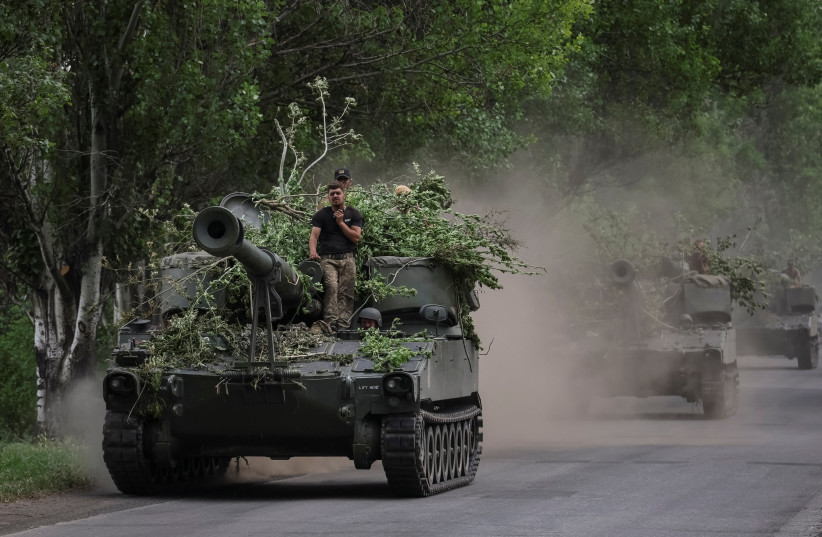The head of NATO said on Sunday the war in Ukraine could last years and Ukrainian forces faced intensified Russian assaults after the EU executive recommended that Kyiv should be granted the status of a candidate to join the bloc.
NATO Secretary-General Jens Stoltenberg was cited by Germany's Bild am Sonntag newspaper as saying the supply of state-of-the-art weaponry to Ukrainian troops would increase the chance of liberating the eastern Donbas region from Russian control.
"We must prepare for the fact that it could take years. We must not let up in supporting Ukraine," he said. "Even if the costs are high, not only for military support, also because of rising energy and food prices."
British Prime Minister Boris Johnson, who visited Kyiv on Friday, made similar comments about the need to prepare for a long war in an op-ed for London's Sunday Times newspaper.
Speaking to reporters on Saturday he stressed the need to avoid "Ukraine fatigue" and with Russian forces "grinding forward inch by inch," for allies to show the Ukrainians they were there to support them for a long time.

"Everything will depend on whether Ukraine can strengthen its ability to defend its soil faster than Russia can renew its capacity to attack."
British Prime Minister Boris Johnson
In the op-ed, he said this meant ensuring "Ukraine receives weapons, equipment, ammunition and training more rapidly than the invader."
"Time is the vital factor," Johnson said. "Everything will depend on whether Ukraine can strengthen its ability to defend its soil faster than Russia can renew its capacity to attack."
Ukraine received a significant boost on Friday when the European Commission recommended that it be granted EU candidate status - something European Union countries are expected to endorse at a summit this week.
This would put Ukraine on course to realize an aspiration seen as out of reach before Russia's Feb. 24 invasion, even if actual membership could take years.
INTENSIFIED ATTACKS
On Ukraine's battlefields, Russian attacks intensified.
Sievierodonetsk, a prime target in Moscow's offensive to seize full control of the eastern region of Luhansk, was again under heavy artillery and rocket fire as Russian forces attacked areas outside the industrial city, the Ukrainian military said.
The Ukrainian armed forces' general staff admitted its forces had suffered a military setback in the settlement of Metolkine, just to the southeast of Sievierodonetsk.
"As a result of artillery fire and an assault, the enemy has partial success in the village of Metolkine, trying to gain a foothold," it said in a Facebook post late on Saturday.
Serhiy Gaidai, the Ukrainian-appointed governor of Luhansk, referred in a separate online post to "tough battles" in Metolkine.
Russia's Tass news agency, citing a source working for Russian-backed separatists, said many Ukrainian fighters had surrendered in Metolkine.
To the northwest, several Russian missiles hit a gasworks in Izium district, and Russian rockets rained down on a suburb of Kharkiv, Ukraine's second-largest city, hitting a municipal building and starting a fire in a block of flats, but causing no casualties, Ukrainian authorities said.
Ukrainian authorities also reported shelling of locations further west in Poltava and Dnipropetrovsk, and on Saturday they said three Russian missiles destroyed a fuel storage depot in the town of Novomoskovsk, wounding 11 people, one critically.
The Ukrainian armed forces' general staff said Russian troops on a reconnaissance mission near the town of Krasnopillya had been beaten back with heavy casualties on Saturday.
Reuters could not independently confirm the battlefield accounts.
ZELENSKY DEFIANCE
Ukrainian President Volodymyr Zelensky, whose defiance has inspired Ukrainians and won him global respect, said in a Telegram post on Saturday he had visited soldiers on the southern front line in the Mykolaiv region, about 550 km (340 miles) south of Kyiv.
"Our brave men and women. Each one of them is working flat out," he said. "We will definitely hold out! We will definitely win!"
A video showed Zelensky in his trademark khaki t-shirt handing out medals and posing for selfies with servicemen.
Zelensky's office said he had also visited National Guard positions in the southern region of Odesa to the west of Mykolaiv. Neither he nor his office said when the trips took place, but he did not deliver his customary nighttime address on Saturday.
Zelensky has remained mostly in Kyiv since Russia invaded Ukraine, although in recent weeks he has made unannounced visits to Kharkiv, and two eastern cities close to where battles are being fought.
One of Russian President Vladimir Putin's stated goals when he ordered his troops into Ukraine was to halt the eastward expansion of the NATO military alliance and keep Moscow's southern neighbor outside of the West's sphere of influence.
But the war, which has killed thousands of people, turned cities into rubble and sent millions fleeing, has had the opposite effect - convincing Finland and Sweden to seek to join NATO - and helping to pave the way for Ukraine's EU membership bid.
